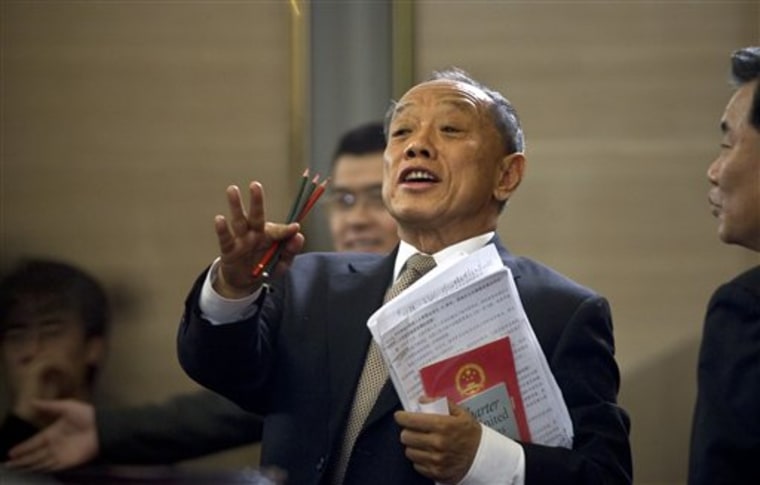China announced a nearly 15 percent rise in military spending on Wednesday — a smaller boost than in previous years — as the national legislature prepared to open its annual session with a focus firmly on overcoming the country's brewing economic crisis.
The 14.9 percent increase in defense spending is the lowest in three years, a possible reflection of shifting priorities amid plans for a 4 trillion yuan ($586 billion) stimulus package and a 850 billion yuan ($124 billion) spending boost to expand and revamp an inadequate health care system.
"There seems to be concern with the slowing economy. ... They may want to keep down spending as a percentage of the economic output," said Christian Le Miere, senior Asia analyst at Jane's Country Risk in London.
Thursday's opening session of the National People's Congress will unveil a national budget that features a hefty stimulus plan to reinvigorate the flagging economy and ward off the global economic downturn.
China's leadership believes that maintaining a strong rate of growth is essential to creating jobs, raising incomes and staving off unrest in a society that has grown used to steadily rising standards of living. Economic growth of anything less than 7 percent or 8 percent, some officials say, would strain stability.
Plays down worries
In announcing the defense spending, Li Zhaoxing, a spokesman for the national legislature, played down worries about China's military might, saying the boost was "modest" and suitable for the world's third-largest economy. He said much of the additional funding would go toward boosting salaries and benefits for China's 2.3 million-strong military force, the world's largest.
Li also pointed to increased spending by the People's Liberation Army on noncombat operations, ranging from security for last August's Beijing Olympics to anti-terrorism missions and relief work following last year's devastating Sichuan earthquake. China has also taken on an increasingly robust role in multinational missions including U.N. peacekeeping operations and anti-piracy patrols in the Gulf of Aden.
While China's defense spending amounts to just 1.4 percent of GDP, compared to 4 percent for the U.S., that's "still relatively high for a country not engaged in a conflict anywhere," Le Miere said.
Teng Jianqun, a retired People's Liberation Army colonel who now serves as deputy secretary general of the China Arms Control and Disarmament Association, said the growth rate for military spending should decline, but "the double-digit rate will remain for at least a few years in the future."
The 480.68 billion yuan ($70.27 billion) military budget follows a 17.6 percent increase last year and 17.8 percent in 2007 — the biggest jump in more than a decade. It also is the 19th double-digit percentage increase in the past two decades.
Li, the congress spokesman, said the latest figure equals 6.3 percent of the overall budget for 2009, down slightly from last year.
China's official defense spending is similar to that of Japan, Russia and Britain, but is still dwarfed by U.S. military expenditures, which are nearly 10 times as large. International military experts say China's actual defense budget may be much higher than Beijing says because some spending on pensions, military hardware and other items is not included.
The U.S., Japan and others have questioned the reasons behind Beijing's rapid buildup. The growth of Chinese military power has prompted widespread speculation over possible future conflicts over self-governing Taiwan — which Beijing claims as its own territory — as well as over contested island chains in the South China Sea and crucial sea lanes in the Indian Ocean.
U.S. National Intelligence Director Dennis Blair said last month that China's military spending increases "pose a greater threat to Taiwan." Relations between rival China and Taiwan have warmed recently, but Beijing still threatens to use military force to oppose any move by Taiwan to declare formal independence.
Economic worries a priority
But China's economic worries are clearly the key priority this year. A government adviser said the stimulus plan included in the budget will try to promote consumer spending and sets a goal of 8 percent growth — the same target China has put in budget plans for many years but may have difficulty reaching as demand for Chinese exports evaporates in the U.S. and Europe.
"The report will say that the main goal is to stimulate the economy," said Tan Giok Sie, a Hong Kong businessman and a member of an advisory panel that meets concurrently with the national legislature.
Worried that throwing so much money at the economy would exacerbate already widespread corruption, a group of liberal Communist Party elders has called on the current leadership to be transparent.
"We are very concerned that privileged and corrupt individuals may use this opportunity to enrich themselves, damaging relations between the party and the people and exacerbating social conflicts," they said in a letter dated Jan. 20 and circulated on the Internet.
